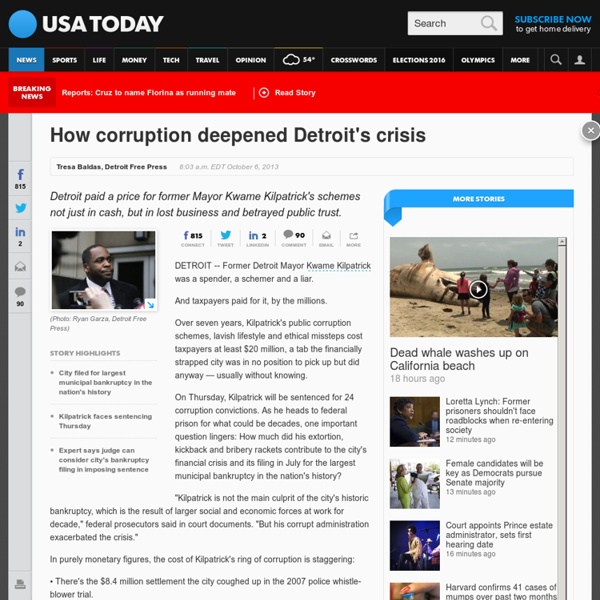How corruption deepened Detroit's crisis

Forbes Welcome
Thanks for coming to Forbes. Please turn off your ad blocker in order to continue. To thank you for doing so, we’re happy to present you with an ad-light experience. Hi again. Thank you for turning off your ad blocker! Thank you for visiting Forbes. We noticed you still have ad blocker enabled. Thank you for turning off your ad blocker.
Anatomy of Detroit’s Decline - Interactive Feature
Mayor Coleman A. Young of Detroit at an event in 1980. Richard Sheinwald/Associated Press The financial crisis facing Detroit was decades in the making, caused in part by a trail of missteps, suspected corruption and inaction. Here is a sampling of some city leaders who trimmed too little, too late and, rather than tackling problems head on, hoped that deep-rooted structural problems would turn out to be cyclical downturns. Charles E. Edward Jeffries, who served as mayor from 1940 to 1948, developed the Detroit Plan, which involved razing 100 blighted acres and preparing the land for redevelopment. Albert Cobo was considered a candidate of the wealthy and of the white during his tenure from 1950 to 1957. Coleman A. Kwame M. Dave Bing, a former professional basketball star, took office in 2009 pledging to solve Detroit’s fiscal problems, which by then were already overwhelming. Related
Detroit pays high price for arson onslaught
Detroit — Arson is a raging epidemic in Detroit, destroying neighborhoods and lives as the city tries to emerge from bankruptcy. Even amid a historic demolition blitz, buildings burn faster than Detroit can raze them. Last year, the city had 3,839 suspicious fires and demolished 3,500 buildings, according to city records analyzed by The Detroit News. Burned homes scar neighborhoods for years: Two-thirds of those that caught fire from 2010-13 are still standing, records show. "Nothing burns like Detroit," said Lt. The Detroit News researched arson for more than three months and found that it remains a huge obstacle to renewal efforts following bankruptcy. Few neighborhoods were untouched by arson and the entire city bears its costs. "People don't realize arson is a felony. Aides to Mayor Mike Duggan, who has made fighting blight the cornerstone of his administration, declined comment on The News' findings or his strategy for reducing arson. 'Arson is like a cancer' The News found:
Report Shows Real Factors Behind Detroit Crisis: Revenue Decline, Wall Street Deals Play Largest Role
Modest Pension Benefits Play Little Role in Financial Crisis DETROIT — In their push for bankruptcy, Emergency Manager Kevyn Orr and other public figures are incorrectly looking at Detroit’s long-term debt—figures generated using aggressive and in some cases inaccurate assumptions—to the detriment of solving the City’s immediate cash-flow crisis and its long-term structural challenges, according to a report released Wednesday by Demos. Detroit is not a corporation, it’s a city, and its bankruptcy proceedings have been focused on the wrong numbers. The Detroit Bankruptcy shows how the current bankruptcy filing is the result of a severe decline in revenue, caused by the 2008 financial crisis, and cuts in annual state revenue sharing starting in 2011. “Detroit is not a corporation, it’s a city, and its bankruptcy proceedings have been focused on the wrong numbers,” said Wallace Turbeville, Senior Fellow at Demos, who authored the report. Detroit’s crisis was caused by multiple factors:
Related:
Related:



